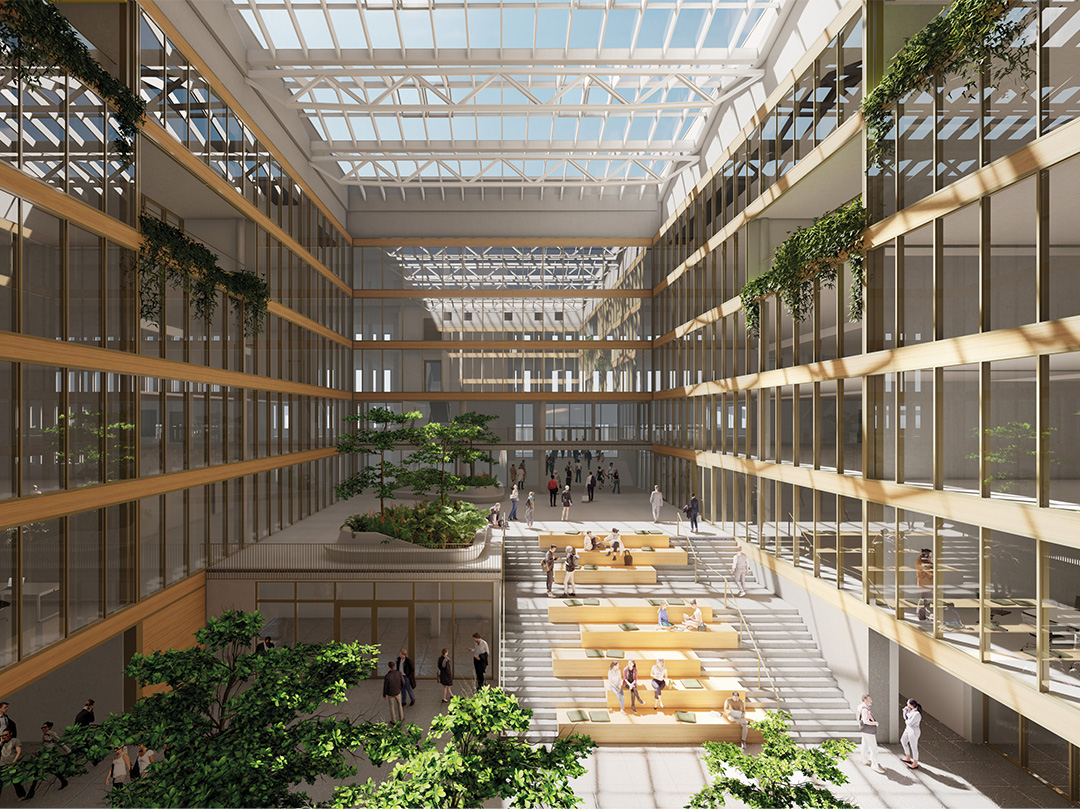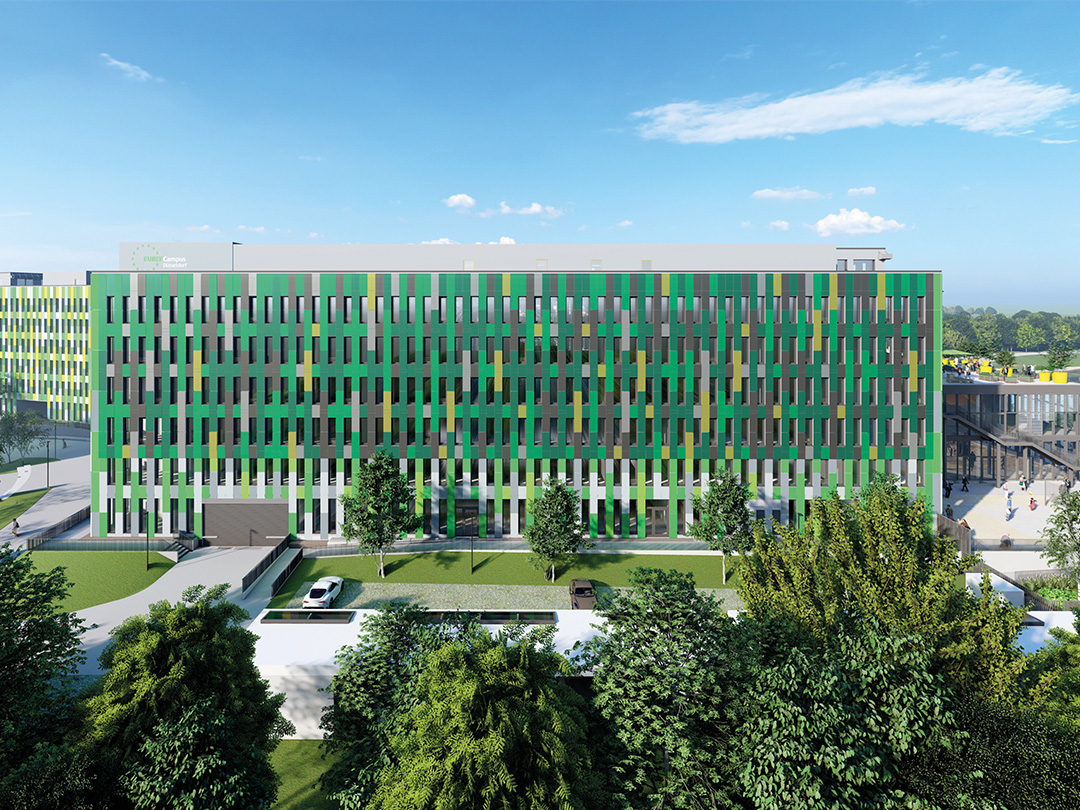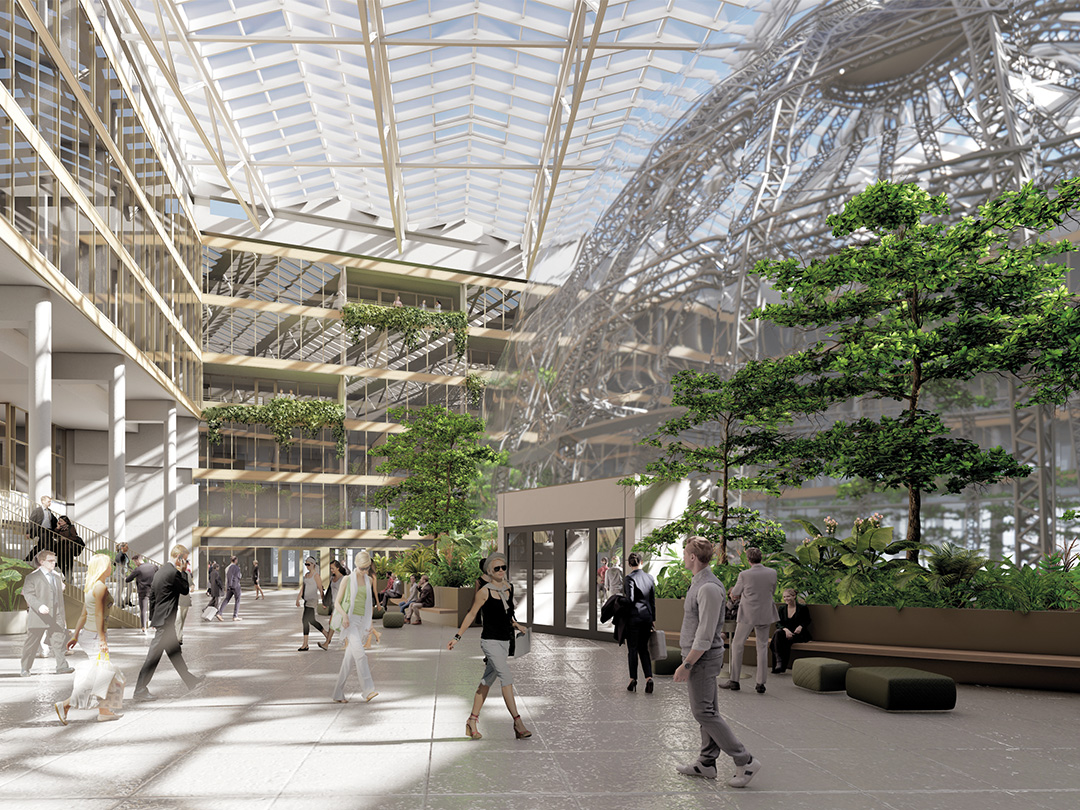EUREF-Campus Düsseldorf
International showcase for the energy transition
With the EUREF-Campus Düsseldorf, EUREF AG is building the second innovation campus in Germany after Berlin. Around 4,000 employees from established companies, science and research will work here on the future topics of energy, mobility and sustainability in close cooperation and in an inspiring environment. EUREF AG is investing a total of EUR 350 million in the development of the project in the immediate vicinity of Düsseldorf Airport. The first and second construction phases were completed in 2024 and 2025 respectively. The third phase, the DUSConnect project, will connect the EUREF Campus with the airport site from 2027.
The EUREF-Campus Düsseldorf is a place where ideas are created, implemented and tested for success. Through intelligent architecture, the use of renewable energy sources, new energy storage systems and the consistent networking of state-of-the-art technology, a visible future location is being created as a real model that shows that and how the energy transition can succeed. We are very proud to be involved in this pioneering project as a partner.

Photo@ EUREF-Campus Düsseldorf, © EUREF AG
Just do it
Showing that the energy transition is feasible and affordable – this was Reinhard Müller’s mission when he founded the European Energy Forum (EUREF) in 2008 and began to realize this idea with the EUREF Campus around the gasometer in Berlin-Schöneberg. The aim was to create a place of the future that would demonstrate how the climate targets could be achieved. Today, around 7,500 people work, teach, learn and research future technologies and innovations in the fields of energy, mobility and climate protection on the EUREF-Campus Berlin – in over 150 companies, start-ups and scientific institutions. The EUREF-Campus Berlin – developed with purely private funding – is a model district for the climate-neutral, resource-conserving and intelligent city of tomorrow. Politicians also like to adorn themselves with this: the coalition agreement of the new black-red government was presented here in May 2025.
An idea goes into series production
Based on the Berlin model, the second innovation campus in Germany is currently being built in the immediate vicinity of Düsseldorf Airport. The EUREF-Campus Düsseldorf is not only a pioneer in terms of sustainability, but also shows that planning and construction can be realized quickly in this country: It took just over six years from the initial discussions with the city of Düsseldorf to the completion of the first construction phase in September 2024 – despite the challenges associated with the pandemic. The EUREF-Campus Düsseldorf consists of two six-storey structures: a main building and DUSConnect. The total gross floor area is around 102,000 square meters, the rental space amounts to 80,000 square meters. EUREF-Consulting Gesellschaft von Architekten und Ingenieuren mbH, Berlin, a member of the EUREF Group, is responsible for the design. EUREF AG commissioned the Implenia building construction branches Großprojekte and Essen with the turnkey construction of the new building.
Architecture
The main building, which is positioned between the airport and the Lichtenbroich quarry pond, is divided into three sections. The office and showrooms with flexible sizes ranging from 100 sqm to 10,000 sqm are each grouped around spacious, green atriums. The resulting atriums connect the building sections and function as communal and event areas. On the lake side, a large terrace offers additional quality of stay. The building has a direct connection to both the airport terminal and the train station – just like the entire campus, which boasts an extremely convenient location. The architectural highlight is the EUREF dome, which was originally built in 2006 as the “Bundestag Arena” as part of the soccer World Cup, modeled on the Reichstag dome in Berlin. The 21-metre-high steel construction with a diameter of 32 meters offers space for 600 people and made its first appearance as an event location at the end of May.
By the way: Not only the The buildings are climate-neutral. The gastronomic concept – developed by top Hamburg chef Cornelia Poletto and Klüh Catering – also meets all sustainability criteria. It includes five restaurants and offers regional, healthy cuisine for employees and guests.

Photo@ EUREF-Campus Düsseldorf, © EUREF AG

Photo@ EUREF-Campus Düsseldorf, © EUREF AG

Photo@ EUREF-Campus Düsseldorf, © EUREF AG

Photo@ EUREF-Campus Düsseldorf, © EUREF AG
The energy turnaround hands-on
Thanks to intelligent architecture, the use of innovative energy storage systems and renewable energy sources and the consistent networking of state-of-the-art technology, the CO₂ climate protection targets of the state capital Düsseldorf by 2035 and the federal government by 2045 will be achieved from the outset. EUREF, Stadtwerke Düsseldorf and BLS Energieplan drew on local conditions and resources to develop the energy concept. The aim is to supply the campus site with CO2-neutral and secure energy. And this with an annual building energy requirement of 2.4 gigawatt hours for heating and 2.7 gigawatt hours for air conditioning. This is achieved, among other things, through the thermal utilization of the adjacent Lichtenbroich quarry pond, a gigantic heat storage facility that uses highly efficient heat pumps to provide both heat in winter and cooling in summer. summer. Another innovative energy source is the sun, which uses PV systems on the roof and façade of the Innovation Campus to provide electricity for the building’s own consumption all year round. The ambient air is also used to cool the building and dissipates excess heat via a hybrid cooler. Stadtwerke Düsseldorf supplies the building with climate-friendly district heating on particularly cold days. The concept is complemented by an intelligent energy management system from Schneider Electric – the Microgrid Advisor. This links all energy generators – seawater, heat pumps, solar energy, hybrid coolers, district heating, energy storage and charging infrastructure – to form an integrated energy infrastructure.
Fresh air
State-of-the-art ventilation systems will continuously supply the entire campus with fresh air. The use of UV-C irradiation filters 99.9% of all known viruses from the air. In addition to cleaning and irradiating the outside air, clean room technology ensures very high indoor air quality.
H+E Haustechnik und Elektro GmbH, Plattling, was responsible for the planning and execution of the ventilation, heating and cooling, plumbing, sprinkler and fire extinguishing systems. As their project partner, we equipped the event areas of the EUREF-Campus Düsseldorf with ClimaLevel underfloor heating.
More than tenants
Among the well-known tenants of the EUREF-Campus Düsseldorf are Schneider Electric GmbH, SPIE Deutschland & Zentraleuropa, the state company NRW. Energy4Climate, Stadtwerke Düsseldorf, Klüh Service Management, Vossloh, Schüco, Wilo and the State Association for Renewable Energies. They are all project partners who are making a decisive contribution to the successful implementation of the project.
Together with four universities and colleges in North Rhine-Westphalia, they are also cooperating on the EUREF Talent Campus: as on the EUREF Campus in Berlin, the EUREF Campus Düsseldorf will also offer dual Master’s degree courses in the field of energy from the winter semester 2025/26. DUSConnect will play a special role as a testing and start-up platform for the mobility of the future. It will also function as a transfer point for commuters and passengers, for whom there will be sharing offers in the field of electromobility as well as a hotel.
At the EUREF-Campus Düsseldorf, business and science will engage in an intensive exchange on the global challenges of the future. The sustainability specialists of and for tomorrow will be trained here so that such places of the future can be realized in as many cities as possible worldwide.
